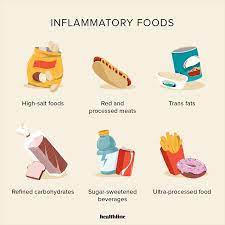In our quest for a healthier lifestyle, it’s crucial to recognize the significant role that diet plays in managing inflammation. Reducing inflammation through diet isn’t just about following a trend; it’s a scientifically backed approach to improving overall well-being.
Introduction
Inflammation, a natural part of the body’s defense mechanism, can become problematic when chronic. It’s linked to various health issues, including cardiovascular diseases, arthritis, and even certain cancers. One effective way to address this concern is by making mindful choices in what we eat.
Understanding Inflammatory Foods
Not all foods are created equal when it comes to inflammation. Some can trigger and exacerbate it. Processed foods, laden with additives and preservatives, often contribute to inflammation. It’s essential to delve deeper into food labels, recognizing and avoiding hidden inflammatory ingredients.
Anti-Inflammatory Foods
On the flip side, incorporating anti-inflammatory foods into our diet can make a significant impact. Colorful fruits and vegetables, rich in antioxidants, are powerful allies. Additionally, omega-3 fatty acids found in fish, flaxseeds, and walnuts have proven anti-inflammatory effects.
The Mediterranean Diet
One diet that stands out for its anti-inflammatory benefits is the Mediterranean diet. With its emphasis on olive oil, nuts, and fatty fish, it provides a delicious and effective way to combat inflammation.
Hydration and Inflammation
Proper hydration is often overlooked in discussions about inflammation. Sugary drinks not only fail to hydrate effectively but can also increase inflammatory markers. Opting for water and herbal teas is a simple yet powerful step towards inflammation control.
Mindful Eating Practices
Mindful eating involves paying full attention to the eating experience, from the colors on the plate to the flavors in each bite. This practice not only enhances enjoyment but can also reduce stress, a known trigger for inflammation.
Spices and Herbs
Nature has provided us with an array of spices and herbs that boast anti-inflammatory properties. Turmeric, with its active compound curcumin, and ginger are known for their potent anti-inflammatory effects. Incorporating these into daily cooking adds both flavor and health benefits.
Gut Health and Inflammation
The gut plays a crucial role in our overall health, including inflammation levels. Maintaining a healthy gut involves incorporating probiotics found in yogurt, kefir, and fermented foods. A balanced gut contributes to a balanced inflammatory response.
Balanced Nutrition
Ensuring a well-rounded and varied diet is key to providing the body with the nutrients it needs to function optimally. A deficiency in certain vitamins and minerals can contribute to inflammation, emphasizing the importance of balanced nutrition.
Foods to Limit or Avoid
Certain foods have been linked to increased inflammation levels. Excessive sugar, processed meats, and refined carbohydrates are among the culprits. Understanding the impact of these foods empowers us to make informed choices.
Lifestyle Changes for Inflammation
Dietary changes alone may not be sufficient for comprehensive inflammation control. Regular exercise and quality sleep are integral components of a holistic approach to reducing inflammation. Physical activity and adequate rest contribute to overall well-being.
Cooking Methods and Inflammation
The way we cook our food matters. Opting for healthier cooking methods, such as grilling, steaming, or baking, preserves the nutritional value of the ingredients. On the contrary, deep-frying and excessive use of high heat can increase the inflammatory potential of foods.
Personalized Approach to Diet
Individual responses to dietary changes can vary significantly. Factors such as age, genetics, and existing health conditions play a role in how our bodies react. Consulting with a healthcare professional ensures a personalized approach tailored to individual needs.
Tracking Progress
Embarking on a journey to reduce inflammation through diet is commendable, and tracking progress is equally crucial. Keeping a journal or using apps to monitor dietary changes and their impact provides valuable insights. Celebrating small victories along the way motivates continued efforts.
Conclusion
In conclusion, the battle against inflammation is multifaceted, and our diet plays a pivotal role. By making informed choices, embracing anti-inflammatory foods, and adopting a holistic lifestyle, we can effectively reduce inflammation and pave the way for better health.





